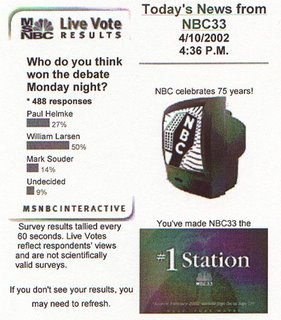Writ of Mandamus
The IRS contends that if they have violated a U.S. Statute, that the U.S. Tax Court does not have statutory authority to require the IRS change IRS regulations to comport with the U.S. Statute. This just blows my mind. The IRS contends that only the U.S. District Court has jurisdiction. However, the U.S. Tax Court is responsible for all disputes arrising under Title 26. I would think that if a dispute is over the interpretation of a statute, that the U.S. Tax Court would have jurisdiction.
Social Security Administration Publication SSA-05-100023 states applying for a social security number is voluntary. In fac their web site says applying for a social security number if voluntary. I have several letters from the Social Security Administration over the past decades stating the same.
The entire dissagreement is over the interpreation of a statute. The IRS removed 25 words, added four additional words and left out the title of the section all together. In addition it does not even mention another section of the same statute. It is like it does not exist.
26 USC 6109(c)
Requirement of information For purposes of this section, the Secretary is authorized to require such information as may be necessary to assign an identifying number to any person
26 USC 6109(d)
Use of a social security number The social security account number issued to an individual for purposes of section 205(c)(2)(A) of the Social Security Act shall, except as shall otherwise be specified under regulations of the Secretary, be used as the identifying number for such individual for purposes of this title.
The IRS interpretation: Red are new words. Strike through are deleted words.
(d)Use of a social security number.
The social security account number issued to an individual for purposes of section 205(c)(2)(A) of the Social Security Act shall, except as shall otherwise be specified under applicable regulations of the Secretary, be used as is the identifying number of the for such individual for purposes of this title.
In construing a statute, courts generally seek the plain and literal meaning of its language. See United States v. Locke, 471 U.S. 84, 93, 95-96 (1985); United States v. American Trucking Associations, Inc., 310 U.S. 534, 543 (1940). For that purpose, courts generally assume that Congress uses common words in their popular meaning. See Commissioner v. Groetzinger, 480 U.S. 23, 28 (1987), affg. 771 F.2d 269 (7th Cir. 1985).
In deciding whether the regulation comports with the statute’s plain language, we look to the ordinary usage or settled meanings of the words used in the statute by Congress. See Lynch v. Alworth-Stephens Co., 267 U.S. 364, 370 (1925). There is a strong presumption that Congress expresses its intention through the language it chooses. See INS v. Cardoza- Fonseca, 480 U.S. 421, 432 n.12 (1987).
A regulation may not contradict the unambiguous language of a statute. See Citizen’s Natl. Bank v. United States, 417 F.2d 675 (5th Cir. 1969); Hefti v. Commissioner, 97 T.C. 180, 189 (1991), affd. 983 F.2d 868 (8th Cir. 1993).
Where the statute’s language is plain, the language is where the interpretive task should end, and the sole function of the courts is to enforce such language according to its terms. United States v. Ron Pair Enters., Inc., 489 U.S. 235, 241 (1989); United States v. Merriam, 263 U.S. 179, 187-188 (1923)(stating that tax statutes are not to be extended by implication beyond the clear import of the language used).
Does 26 U.S.C. 6109(c) require those eligible for a social Security Number to have one?
Does the plain language interpretation mean that if you have a SSN, that is your identifying number. However, the secretary has the option of making an exception to using the SSN and regulate something else. The IRS interprest "except as otherise specified under regulations" that it can expand the use of the SSN to all who are eligible.



2 Comments:
This comment has been removed by a blog administrator.
Bill:
Im not going to pretend that I know EVERYTHING about the legalese ensconced above (I do grasp the gist of the matter), but I will state that having worked for the USTD (in another lifetime), there are a LOT of "things" they are not allowed to do....BUT do anyway, in flagrant violation of current laws.
It never ceases to amaze me how much certain entities can get away with when our attention is "diverted".
B.G.
Post a Comment
<< Home